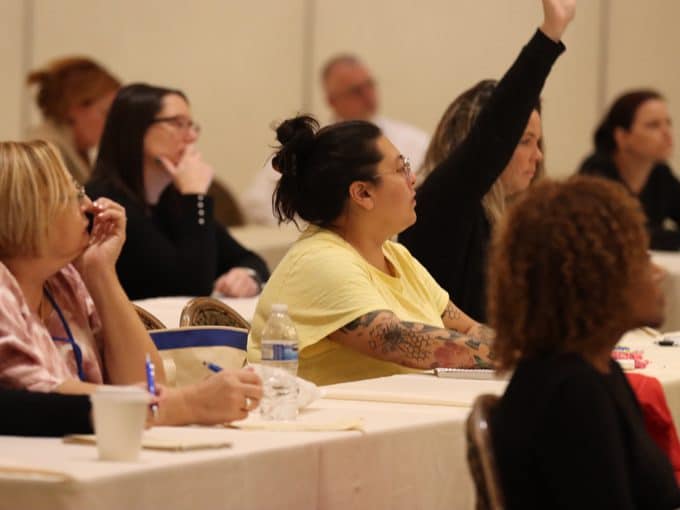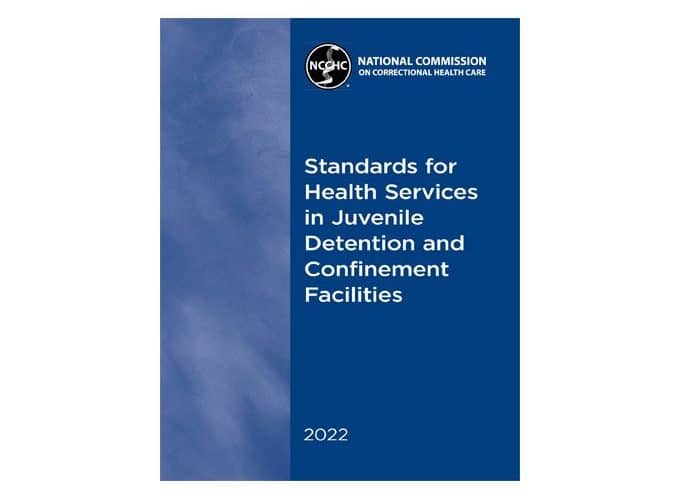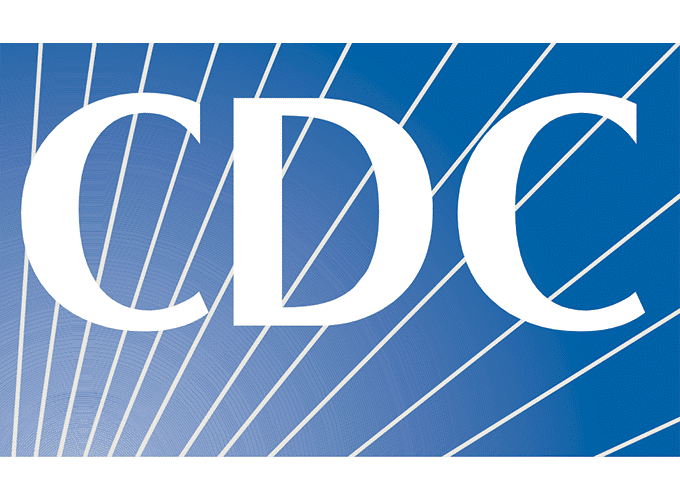
Share Your Expertise at the NCCHC Spring Conference on Correctional Health Care
Help shape the future of correctional health care.
Home 2022 Standards for Health Services in Juvenile Detention & Confinement Facilities: What’s New?
 Aug 15, 2023
Aug 15, 2023In this article, we will highlight changes and new concepts in the 2022 Standards for Health Services in Juvenile Detention and Confinement Facilities.
The Standards have been revised, reorganized, and simplified to improve their usefulness. As always, the standards reflect the latest evidence and best practices in meeting professional, legal, and ethical requirements in delivering correctional health care.
The manual has been streamlined and reorganized to create a more user-friendly guide for correctional health professionals using the standards in everyday practice. Each section of standards begins with an introductory paragraph that describes the intent of the section in the overall organization of a correctional health care system. Standard wording has a more global approach, while the compliance indicators give detail that is more specific on requirements to meet the standard.
Reorganization and Consolidation
The first major change that users will notice is that there are now seven sections instead of nine. Most content from former sections F (Health Promotion), H (Health Records) and I (Medical-Legal Issues) was consolidated and/or relocated. For example, all the 2015 Section F standards were moved into other sections. All the 2015 Section H standards were consolidated into one standard, A-08 Health Records, although most of the content did not change.
The 2015 standards A-07 Emergency Response Plan and E-08 Emergency Services were consolidated into one standard, D-07 Emergency Services and Response Plan. Similarly, standards G-01 Chronic Disease Services, G-02 Patients with Special Health Needs, and G-10 Aids to Reduce the Effects of Impairment were combined into one standard, F-01 Specialized Services for Chronic Disease and Other Needs. Section G (formerly Special Needs and Services) now contains standards related to Medical-Legal Issues.
As health administrators update policies and procedures to align with the 2022 standards, the way that policies are organized can follow any format or order that an agency chooses. However, every standard, including compliance indicators and definitions, should be addressed in the facility’s policy and procedure manual. To help users easily identify which standards have been combined and/or relocated, the introductory section of the Standards manual has two tables that detail these changes. These tables may prove helpful as policies and procedures are updated.
Highlights of Changes by Section
In addition, there are many changes and new concepts within each section. It is important to refer to the complete set of standards when revising your correctional health program as this column will highlight only significant changes.
Section A – Governance and Administration
• A-01 Access to Care – Identifies assessing co-payment fees as a potential barrier to youth’s access to health services
• A-02 Responsible Health Authority – Requires a designated dentist if dental services are under a separate organizational structure
• A-04 Administrative Meetings and Reports – Examples of areas appropriate for monitoring on monthly statistical reports has been expanded
• A-05 Policies and Procedures – Health staff are to review policies and procedures when they are revised, or new policies are introduced
• A-06 Continuous Quality Improvement Program – Requires CQI meeting minutes or summaries be retained and copies available and reviewed by all appropriate personnel; health record reviews are required as part of the CQI program (previously required under Continuity and Coordination of Care During Incarceration); at least one process and/or outcome study must be done annually
• A-07 Privacy of Care – Requires privacy (e.g., privacy screen, curtain, private area) during physical exams, with special considerations for pelvic, rectal, breast or other genital exams
• A-09 Procedure in the Event of a Death – Administrative reviews no longer have the 30-day requirement; requires specific content by maintained on a death review log
• A-10 Grievance Process for Health Care Complaints – In addition to grievances being timely and based on principles of adequate medical care, they must also include documentation of response
Section B – Health Promotion, Safety, and Disease Prevention
• B-01 Healthy Lifestyle Promotion – Requires the facility provide a heart-healthy diet; requires a nutritionally adequate diet for the general population and a review of the regular diet menu by a registered dietitian nutritionist (RDN) or other licensed qualified nutrition professional at least annually (was every 6 months); requires a procedure in place notify the RDN when a change is made to the regular diet menu; additional examples of health education have been provided; additional information on providing a heart-healthy diet has been provided; additional information on sleep disturbances has been provided
• B-02 Infectious Disease Prevention and Control – New language added to include equipment being sterilized per applicable recommendations and/or regulations; New language added to clarify negative pressure rooms must be functional; additional recommendation added to Discussion section on the topic of implementing a committee to oversee infection control practices within the facility
• B-03 Clinical Preventive Services – The responsible physician determines the medical necessity and/or timing of screenings and other preventive services, including screening for communicable diseases; the dentist determines the frequency and content of periodic dental evaluations
• B-04 Medical Surveillance of Youth Workers – New standard requires facilities to have a program to prevent illness and injury among the youth worker population
• B-05 Suicide Prevention and Intervention – Requires the suicide prevention program be approved by both the responsible health authority and facility administrator; clarifies that the monitoring of acutely and nonacutely suicidal inmates is to be completed by facility staff; clarifies in the Discussion section that use of other youths in any way is not a substitute for staff supervision in suicide monitoring practices
• B-06 Contraception and Family Planning Services – Requires emergency contraception be available to female youth both at intake and any time they may have unprotected intercourse in compliance with laws of the jurisdiction; requires all youth (not just females) be provided with counseling on reproductive life goals and that they have access to written information on contraception methods and community resources
• B-07 Communication on Patients’ Health Needs – Expanded examples of situations where custody staff should be informed of special needs
• B-09 Staff Safety – Requires methods of communication (e.g., radio, panic button, voice proximity) between health staff and custody staff; requires custody staff be requested and readily available to health staff if a safety concern arises; requires items subject to abuse be inventoried on each shift where health staff are present, and discrepancies immediately reported to the custody staff; requires health staff identify and use contemporary equipment during the course of their duties; additional language was added to the Discussion section to provide clarification on items subject to abuse and examples of exceptions as to when some of these items must be counted
Section C – Personnel and Training
• C-01 Credentials – Requires an inquiry with the National Practitioner Data Bank (NPDB) for all individuals authorized to write prescriptions; requires specialists providing on-site or telehealth services have credentials on file
• C-02 Clinical Performance Enhancement – Clarifies which disciplines are required to have an annual clinical performance enhancement review; requires clinical performance enhancement reviews for all on-site and telehealth full-time, part-time and per diem employees in each category
• C-03 Professional Development – Requires all qualified health care professionals (QHCPs) obtain at least 12 hours of education training per year; requires the responsible health authority document compliance with continuing education requirements and maintain a list of the state’s CE requirements for each category of licensure of all QHCPs; requires CPR certification that must include a hands-on demonstration prior to certification
• C-04 Health Training for Custody Staff – Requires a health-related training program be established and approved by the responsible health authority and facility administrator; requires several training topics, including newly added topics on AED, use of an opioid reversal agent, allergies and anaphylaxis, dental emergencies, commercial sexual exploitation of children, and maintaining patient confidentiality; requires CPR certification that must include a hands-on demonstration prior to certification
• C-07 Staffing – Requires prescriber, nursing, dental, and mental health time be sufficient to fulfill clinical responsibilities; requires responsible physician time sufficient to fulfill administrative responsibilities
• C-08 Health Care Liaison – Requires annual review and approval of the health care liaison duties (limited to providing access to care) by the responsible health authority, responsible physician, and facility administrator
• C-09 Orientation for Health Staff – Requires the orientation lesson plan for health staff be reviewed and approved annually by the responsible health authority and facility administrator; definitions provide guidance as to what specific topics are required as a minimum in the basic orientation and the in-depth orientation
Section D – Ancillary Health Care Services
• D-02 Medication Services – Requires medications be administered or delivered to the patient in a timely and safe manner; a formulary is no longer required but, if used, there must be a process to obtain nonformulary medications in a timely manner
• D-03 Clinic Space, Equipment, and Supplies – Requires pharmaceuticals, medical supplies, and mobile emergency equipment be checked in accordance with policy (and any items subject to abuse checked in accordance with Y-B-09); additional equipment is required, including sterilizer for nondisposable medical or dental equipment, pulse oximeter, and personal protective equipment
• D-05 Medical Diets – Requires a review of themedical diet menu for nutritional adequacy by a registered dietitian nutritionist (RDN) or other licensed qualified dietician at least annually (was every 6 months); classification of the standard changed to essential
• D-06 Patient Escort – Clarifies this standard applies to medical, dental, and mental health appointments both on-site and off-site
• D-07 Emergency Services and Response Plan – Requires facility staff provide emergency services until qualified health care professionals arrive; updated frequency of mass-disaster drills to be conducted so each shift where health staff are present has participated over a three-year period, including satellites (eliminated the annual requirement)
• D-08 Hospital and Specialty Care – Requires documentation in the health record of the attempts by health staff to obtain outside records if off-site records and recommendations are not immediately available when the patient returns from an off-site appointment
Section E – Patient Care and Treatment
• E-01 Information on Health Services – In addition to providing information in writing, added the options providing information to youth within 24 hours of arrival to include electronic and video formats
• E-02 Receiving Screening – Requires the receiving screening be completed as soon as possible, within 4 hours upon acceptance into the facility; additional inquiries pertaining to prescription medications (including type, amount, and time of last use) and victimization by commercial sexual exploitation of children to the receiving screening process; requires a pregnancy test be completed during the receiving screening process for all biological females admitted to the facility reporting current opioid use
• E-03 Transfer Screening – Eliminated the 12-hour requirement for review of the transferred youth’s health record, but the record must still be reviewed and must have evidence of continuity of care and medication administration; transferred youth who do not have initial medical, dental, or mental health assessments done at an intake facility are to be evaluated at the receiving facility within 7 days of arrival to the facility
• E-04 Initial Health Assessment – Added the option of deferring the initial health assessment if there is a documented health assessment on file within the last 12 months and the receiving screening shows no change in health status; requires a physical examination performed by a provider or RN
• E-05 Mental Health Assessment and Evaluation – Requires the mental health assessment be completed within 7 days of admission (was 14 days); additional inquiries pertaining to substance withdrawal seizures or other complications, sexual abuse, adverse childhood experiences, drug or alcohol withdrawal or intoxication, and an assessment of the youth’s strengths and interests; requires mental health evaluations of patients with positive mental health screens (assessments) be completed within 30 days or sooner
• E-06 Oral Care – Requires oral care be performed under the direction and supervision of a licensed dentist; requires oral care to be timely and include immediate access for urgent conditions; requires instruction in oral hygiene and preventive oral education be given within seven days of admission (was 14 days); requires a toothbrush and toothpaste be provided to all youth; eliminated the requirement of an initial oral examination if a readmitted youth has received an oral exam in the correctional system within the past year; requires policies for the management of youth who have received orthodontic care in the community prior to admission
• E-07 Nonemergency Health Care Requests and Services – Requires a documented face-to-face encounter with the patient within 24 hours of receipt of a health care request that is clinical in nature (was 48 hours); requires all aspects of the health care requests process to be documented, dated, and timed
• E-08 Nursing Assessment Protocols and Procedures – Nursing assessment protocols can only include over-the-counter medications (standing orders are no longer authorized)
• E-10 Discharge Planning – For planned releases, requires facilities have a process to assist with health insurance application prior to release; requires all aspects of discharge planning to be documented in the health record
Section F – Special Needs and Services
• F-01 Specialized Services for Chronic Disease and Other Needs – Requires patients who need specialized services to be identified, including those who with an intellectual disability, serious mental health needs, physical disability, and/or those who are frail; revised the list of required protocols, removing some and adding mood disorders and psychotic disorders; added additional information to the Discussion section regarding child maltreatment, peer victimization, exposure to family and community violence, as well as transgender and gender-nonconforming youth
• F-02 Infirmary-Level Care – Similar to the name change (formerly Infirmary Care), the focus is on the level of care provided, regardless of location of delivery; requires facility staff to be within sight or sound of infirmary-level care patients and qualified health care professionals must be able to respond in a timely manner; no longer requires a copy of the discharge (from infirmary-level care) summary, but does require complete documentation of the care and treatment given be included in the health record
• F-03 Mental Health Services – Additional requirements for outpatient mental health services now include universal screening and identification and referral of youths with mental health needs, psychosocial / psychoeducational programs, and treatment documentation and follow-up; when commitment or transfer to an inpatient psychiatric setting is clinically indicated, requires procedures are followed, the transfer occurs timely, and the patient is safely housed and monitored until the transfer occurs; requires patients be seen as required in their prescribed individual outpatient treatment plans; requires a qualified mental health professional document a review of all mental health programming at least annually and when there is significant change in curriculum; additional language added to the Discussion section pertaining to several newly added topics, including universal screening of youths, utilization of community self-help and peer support initiatives (i.e., AA and NA) as an appropriate supplement to counseling provided by staff on-site, and the involvement of parents / legal guardians being encouraged in developing treatment plan and planning for continuity of care upon release
• F-04 Medically Supervised Withdrawal and Treatment – Requires protocols to be reviewed and approved annually by the responsible physician; requires the facility to have a policy addressing medication-assisted treatment (MAT) and that their medications be continued, unless medically contraindicated; additional language added to the Discussion section pertaining to medications for opioid use disorders (MOUD), steps to be taken when a pregnant youth who uses or has opioid use disorder is admitted to the facility and additional resource sources available for facilities
• F-05 Counseling and Care of the Pregnant Youth – Requires counseling and administering of recommended vaccines in accordance with national guidelines; requires offering and providing of medications for opioid use disorder (MOUD) (methadone, buprenorphine or naltrexone) for pregnant patients with active opioid use disorder; requires emergency delivery kits available in the facility; requires custody restraints to be avoided at all points in pregnancy and the postpartum period, but if used, to be limited to handcuffs in front of the body; extensive additional language added to the Discussion section to provide additional guidance for this standard
• F-06 Response to Sexual Assault and Abuse – Requires protocols regarding detection, prevention, and reduction of sexual abuse; requires emergency contraception be available to youth who have experienced sexual assault within the prior 5 days; allows for treatment and gathering of evidence to be done via referral to a community facility or to be performed in-house; requires prophylactic treatment and follow-up care for STIs and other communicable diseases; additional language added to the Discussion section pertaining to guidance on emergency contraception, gathering forensic evidence, and therapeutic relationships with individuals involved in the incident
• F-07 Care for the Terminally Ill – Requires advance directives, health care proxies, and “do not resuscitate” (DNR) orders be available when medically appropriate; additional language added to the Discussion section pertaining to guidance on hospice level care and potential early release for terminally ill patients
Section G – Medical-Legal Issues
• G-01 Restraint and Seclusion – Eliminated requirement for on-call medical staff to be notified if health staff are not on-site when custody-ordered restraints are initiated, allowing for health staff to review the health record and initiate monitoring upon their arrival on-site
• G-02 Restrictive Housing (Formerly called Segregated Juveniles) – Revised language to require custody or program staff to monitor youths in restrictive housing at irregular intervals no more than 15 minutes apart (was at least every 15 minutes); adjusted limit of restriction to be no more than 4-5 hours (was 2-5 hours); additional language added to the Discussion section pertaining to not using restrictive housing for disciplinary or punitive measures, or due to staffing shortage, or administrative convenience
• G-03 Emergency Psychotropic Medication – Revised timeframes for follow-up documentation by nursing staff to occur within the first 15 minutes (was within 1st hour), then every 30 minutes (was again within 24 hours) until transfer to an inpatient setting or the patient no longer requires monitoring
• G-04 Therapeutic Relationship, Forensic Information, and Disciplinary Actions – Health staff may not participate in disciplinary action nor be compelled to provide clinical information solely for the purposes of discipline; specifies treatments and medications are never withheld as a form of punishment; specifies restrictive housing and restraints are never clinically implemented as disciplinary action; additional language added to the Discussion section to provide further guidance on the new compliance indicators added to this standard
• G-05 Informed Consent, Assent, and Right to Refuse – Requires all examinations, treatments, and procedures be governed by informed consent and assent practices applicable in the jurisdiction; requires written informed consent be documented for procedures and medications that in the community setting would require informed consent; additional language added to the Discussion section pertaining to refusals being specific to the treatment, examination, or procedure being offered and blanket refusals not being compliant with this standard, as well as added information on frequency and/or facility protocol for circumstances of signed refusal forms
• G-06 Medical and Other Research – Requires guidelines be in place for the process of obtaining informed consent from the patient or legal guardian and assent from the patient in any situation of medical or other research
Revised Appendix A – Introduction to NCCHC Accreditation
In addition to the standards being revised, Appendix A also received an extensive update providing comprehensive guidance on the NCCHC accreditation application and survey process, as well as additional information on NCCHC resources and publications.
More Useful for You
NCCHC received many excellent comments and suggestions from experts and users of the standards throughout the country. The 2022 Standards for Health Services in Juvenile Detention and Confinement Facilities were crafted after careful consideration of all ideas so they would be useful to facilities seeking an effective and efficient health care delivery system. The result promises to promote improved health services in our nation’s juvenile detention facilities.
Timeline for Implementation
Effective August 1, 2023, all surveys will be conducted using the 2022 standards.
By Wendy Habert, MBA, CCHP, PHR, NCCHC
Wendy Habert, MBA, CCHP, PHR, is NCCHC’s Director of Accreditation. Feel free to contact the NCCHC accreditation team at [email protected] or Wendy Habert directly at [email protected].


